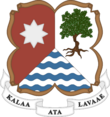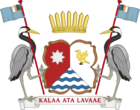Maaita of Freice
| Maaita of the State of Freice | |
|---|---|
 National emblem of Freice | |
 Flag of Freice | |
Incumbent Kaana Tenkel since 30 January 2023 Joint hereditary officeholders
| |
| Style | My Lord (formal, address) |
| Appointer | Representative Council |
| Term length | At the Council's pleasure |
| Inaugural holder | Tuaa Kaalalek |
| Formation | 1872 |
| Succession | Hereditary |
 |
|---|
| This article is part of a series on the politics and government of Freice |
|
Maaita (lit. 'He who Leads') is the title of the head of state of the Country of Freice, an island country in the Kaldaz Sea. The title was first written into the 1917 constitution, enacted under the supervision of Riamo, although the position had been in existence since 1872. In the Common Language, the title is sometimes translated as "Leader" or "Ruler" and, more rarely, as "President" or "King".
The position was created by agreement of the three main chiefs of the island: Tuaa Savou, Mataasat Tailaavu, and Teeakaala Nee'et. Under the agreement, first codified in 1917, the office is hereditary and is held in gross by the chiefs and their lawful descendants. Formally, the office is held by all legal claimants (currently seven), but is exercised by a single claimant for a period of time agreed by all.
The current Maaita, since 30 January 2023, is Kaana Tenkel, who succeeded as the sole claimant to the Tuaa share.
Description
Role and responsibilities
The Maaita is designated Freice's head of state and maintains a role similar to that of a constitutional monarch. Under the constitution, the Maaita is responsible for the following:
- Preside over meetings of the Representative Council.
- Issuing an ordinance appointing the President of the Representative Council.
- Issuing the ordinance appointing committees
- Promulgating laws (countersigned by the president of the Council).
- Countersigning the ratification of treaties in the Council.
Although Maaitas had historically played a significant role in politics, modern Maaitas fulfill a more ceremonial position. Under the new constitution, the Maaita's executive powers are subject to approval in the Council, and the once unrestricted veto power is now limited to an ordinance which can be overruled by a majority of councillors.
Since 2009, the Maaita's role as presiding officer is undertaken by the President of the Representative Council, who is formally the deputy speaker.
Succession
The position is hereditary and possession is held by the inheritors of the three shares initially granted to the three chiefs. Each share constitutes a third of the whole office, with each inheritor possessing a proportion of their share. Under the constitution, holders of the office may designate one or more of their family to inherit their share, and may divide their share as they see fit. Where there are multiple holders of a share, they are required to nominate one of their number to be a "deputy of the share" and to hold the office in their name.
Under the constitution, the office is rotated amongst each share every ten years. If an incumbent dies during their term, their designated successor to their share takes on the post, rather than the position transferring to another share. If they are a nominated deputy, holders of that share nominate a new deputy to complete the term.
Officially, the Maaita is appointed by the Representative Council, but this is a formality which the council is constitutionally required to do. Women face no barrier to succession, beyond the personal prejudices of the Maaita, and there have been a number of female incumbents, who rule with the title of "Maavine" ('She who Leads')
Status
Under the Constitution of Freice, sovereignty is explicitly vested in the people. The head of state is not defined as being of republican or monarchical nature, and various constitutional mechanisms and procedures frustrate an easy categorisation. The position is formally hereditary, but the incumbent is de jure appointed by the Representative Council and serves at its pleasure. The Maaita is also denied many of the customary privileges of monarchy, including a royal style and an enthronement or coronation.
A number of Kaldaist scholars and writers have characterised the position as more akin to an aristocratic system of government, with the various joint-holders of the office compared to feudal hereditary lords.
Claimants to the title of Maaita are entitled to use the title Atee ("Chief") or Amatee ("Dame"). The Maaita/Maavine uses the style of Mauteigama (roughly equivalent to "Highness") for the duration of their tenure. A Maaita is formally styled as "Mauteigama The Maaita Atee [Name]." A Maavine is styled as "Mauteigama The Maavine Amatee [Name]." A Maavine consort is styled as a Maavine regnant, whilst the husband of a Maavine regnant becomes jure uxoris Maaita and is styled as such. Former Maaita's continue to be styled as they were during their tenure, but without the style of "Mauteigama".
Maaitas and Maavines of Freice
- Soni Tasoni* (1983-1993)
- Tenkel Maairai (1993-2003)
- Illaapa Saleevi* (2003-2013)
- Tevee Enneedi* (2013-2023)
- Kaana Tenkel (2023-present)
An asterix (*) designates a nominated deputy.
